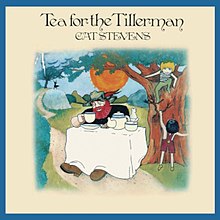Tea for the Tillerman
| Tea for the Tillerman | ||||
|---|---|---|---|---|
 |
||||
| Studio album by Cat Stevens | ||||
| Released | 23 November 1970 | |||
| Recorded | May–July 1970 | |||
| Studio |
Morgan Studios Island Studios Olympic Studios, London, |
|||
| Genre | Folk rock | |||
| Length | 36:49 | |||
| Label |
Island (UK/Europe) A&M (US/Canada) |
|||
| Producer | Paul Samwell-Smith | |||
| Cat Stevens chronology | ||||
|
||||
| Singles from Tea for the Tillerman | ||||
|
||||
Tea for the Tillerman is the fourth studio album by the singer-songwriter Cat Stevens. This album, Stevens' second during 1970, includes many of Stevens' best-known songs including "Where Do the Children Play?", "Hard Headed Woman", "Wild World", "Sad Lisa", "Into White", and "Father and Son". Four of the tracks ("Where Do the Children Play?", "On the Road to Find Out", "Tea for the Tillerman", and "Miles from Nowhere") were featured in the Hal Ashby and Colin Higgins' black comedy film Harold and Maude, in 1971. The track "But I Might Die Tonight" was featured in the film Deep End directed by Jerzy Skolimowski in 1970. Stevens, a former art student, created the artwork featured on the record's cover. "Tea for the Tillerman" was also used over the end credits for the BBC TV show Extras. "Miles From Nowhere" also appeared in the A-Team episode, "Alive at Five" while Templeton Peck is running away.
With "Wild World" as an advance single, this was the album that brought Stevens worldwide fame. The album itself charted into the top 10 in the United States, where he had previously had few listeners.
In November 2008, a "Deluxe Edition" was released featuring a second disc of demos and live recordings. In January 2012, a hi-res 24/192 kHz version was remastered using an Ampex ATR100 and a MSB Technology Studio ADC and released on HDtracks.com.
In a contemporary review for The Village Voice, music critic Robert Christgau gave the album a "B–" and found the music monotonous and lacking the "dry delicacy" Stevens exhibited on Mona Bone Jakon (1970).Rolling Stone magazine's Ben Gerson said that Stevens' songs effortlessly resonate beyond their artfully simple lyrics and hooks, despite his occasional overuse of dynamics "for dramatic effect."
...
Wikipedia
